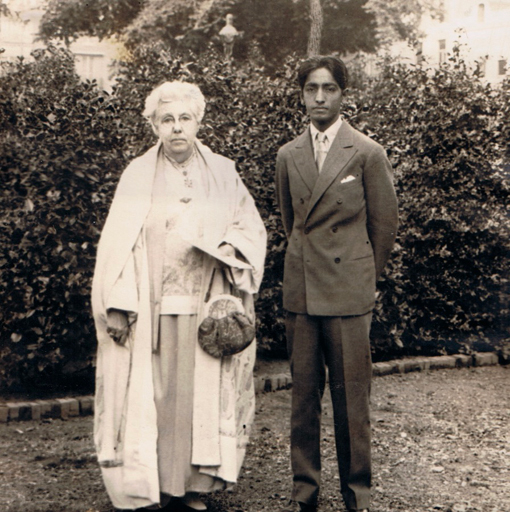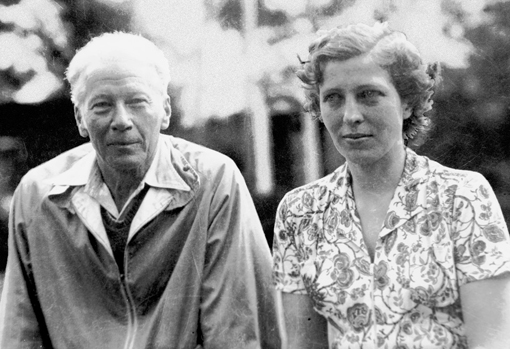|
Happy Valley Foundation was established in 1927 by Dr. Annie Besant, one of the great women of the 20th Century. Dr. Besant, president of the worldwide Theosophical Society for more than twenty-five years, was a renowned social activist who generated significant social and humanitarian reforms in Britain and lent strong support to India’s independence movement.
In 1926, on a journey to the Ojai Valley with J. Krishnamurti, D. Rajagopal, Rosalind Williams (Rajagopal), and Fritz Kunz, Annie Besant visited a vast area of pristine land. She envisioned this site as a place to establish an educational center that would nurture spiritual, artistic and intellectual growth as well as physical and mental well-being. She also knew that sustainable worldwide improvement in the human condition begins with the individual. In 1927, she raised funds to secure nearly 500 acres in the Upper Ojai Valley. She appointed trustees to further her vision of a non-sectarian foundation, "without distinction of race, creed, sex, caste or color," that she named Happy Valley Foundation. |

Annie Besant and J. Krishnamurti
|

Robert Logan and Rosalind Rajagopal |
During WWII an unusual coalition of idealists, including Robert Logan, Louis Zalk, J. Krishnamurti, the Rajagopals, Aldous Huxley, and Dr. Guido Ferrando, gathered in Ojai. Recognizing the prescience of Annie Besant’s educational concepts, they incorporated these into the core philosophy of Happy Valley School (now called Besant Hill School of Happy Valley).
Annie Besant saw this land as a place where her ideals could be given form through activities in which the multiple aspects of culture would find expression. This has been realized with the creation of the Happy Valley Cultural Center. |
 |
|
 |
|
Dr. Annie Besant, the founding member of Besant Hill School of Happy Valley in Ojai, California. A prominent women’s rights activist, president of the Theosophical Society based in Adyar, Chennai, India for 26 years, she was president of the Indian National Congress and a Fabian socialist. She fought for the causes she thought were right, starting with freedom of thought, women’s rights, secularism, birth control, Fabian socialism and workers’ rights. In 1926, Dr. Annie Besant traveled to the United States with her protégé and adopted son, Jiddu Krishnamurti. Dr. Besant visited a vast area of pristine land in Ojai. She envisioned this site as a place to establish an educational center that would nurture spiritual, artistic and intellectual growth as well as physical and mental well-being. She also knew that sustainable worldwide improvement in the human condition begins with the individual. In 1927, Dr. Besant purchased the land where Besant Hill School of Happy Valley now exists for the purpose of creating an educational community where, “students and teachers were to be unfettered in their research and educational experiments.” She envisioned a community that would foster the development of individuals to pursue the task of practical and effective social change. |
|
 |
|
Founding member of Besant Hill School of Happy Valley in Ojai, California. Jiddu Krishnamurti was born on May 11, 1895 in Madanapalle, a small town in south India. He was adopted in his youth by Dr. Annie Besant, then president of the Theosophical Society. Dr. Besant and others proclaimed that Krishnamurti was to be a world teacher whose coming the Theosophists had predicted. He selected the Ojai Valley as a location for his teaching in the United States.
In 1929, however, Krishnamurti renounced the role that he was expected to play. He resigned as figure head of the Theosophists, and cut all ties to any notion of a religious or spiritual organization. This was followed immediately by a “core” statement, summarized as “Truth Is A Pathless Land: man cannot come to it through any organization, through any creed, through any dogma, priest or ritual, not through any philosophic knowledge or psychological technique. He has to find it through the mirror of relationship, through the understanding of the contents of his own mind, through observation and not through intellectual analysis or introspective dissection.” For the rest of his long life, he taught not as an authority but as an investigator looking into life’s fundamental issues through questioning all assumptions, and challenging his listeners to do the same. His talks and dialogues have been compiled and published in more than sixty books and translated into as many different languages. |
 |
|
English novelist, author of, “Brave New World”. Member of the Vedanta society, he was a regular contributor to the Southern California Vedanta journal, Vedanta and the West. Huxley wrote thirty-one books, sixty-five stories, and innumerable articles—Vedantic themes appearing in many of them. Even his novels were created as vehicles for expressing his philosophy. Krishnamurti and Huxley had met in California in early 1938 and became friends for life. They found themselves forced émigré and neighbors in California during the war as they were unable to leave America. The evidence of their subsequent work leaves no doubt that they influenced each other during the crucial period of the war. Huxley served as a trustee of Happy Valley School for fifteen years and was instrumental in developing the school’s educational philosophy, the balance between academics and creative expression, as well as the principle of respecting the unique potential of each student. |
|
 |
|
Happy Valley School opened its doors in the fall of 1946 under the direction of Dr. Guido Ferrando, a retired philosophy professor from Vassar. Ferrando believed strongly in the Socratic method of teaching, encouraging small classes arranged in circles to allow an open flow of questions and discussion between students and teachers.
He viewed education as a process of inquiry where students learn how to think, not what to think, and develop the ability to integrate subjects and cultures into a worldview. |
 |
|
One of the original founders of the school and acting director for over 20 years, Rosalind Rajagopal emphasized non-competitiveness in the classroom. She advocated tolerance and encouraged each student to maintain their independent spirit while living in the context of an international community. Rosalind was instrumental in helping to instill in the school a spirit of living and learning with affection. |
|
 |
|
A prominent theosophist from Philadelphia and close friend of Krishnamurti, Robert Logan was a great contributor to Happy Valley School. He and his wife Sara shared an unwavering devotion to Annie Besant and eagerly supported her vision for Happy Valley, to create a community of people who would help to move mankind beyond the present age of violence and materialism. Together with Louis Zalk, he was a key financial underpinning for the school and, upon his death in 1965, he left a third of his estate to Happy Valley. |
 |
|
Louis Zalk was a businessman from Duluth, Minnesota, whose path converged into a partnership and friendship with other founders of the school based on the ideals and activities that bound them together for the rest of their lives. A key link was the joint esteem for education as the best alleviation for society’s ills, especially in the eyes of those committed to nonviolence. Louis was descended from a rabbinical family that, much like the families of Krishnamurti and Rajagopal, sought spiritual as well as sociological strength through learning. |
|
 |
|
Former faculty member of Happy Valley School, Franklin Lacey joined the Happy Valley Board
in 1959, two years after the opening of
The Music Man, which he had coauthored
with Meridith Wilson. He then became the Director of Happy Valley School.
In 2006 Happy Valley lost one of its dearest friends, Gladys Lacey, the widow of
Franklin Lacey. Gladys had bequeathed to the Foundation a share of the Music Man,
that immortal play that Franklin had co-written with Meredith Willson. From
their long association with Happy Valley, the Laceys understood the difficulties in
balancing financial prudence with the demands of developing new projects. While
making her preferences known, Gladys left no restrictions regarding the use of
Music Man income. This freedom allowed the Foundation to complete struggling
projects and to start new ones that had always been hoped for but were seemingly
out of reach. |
| |
|
|